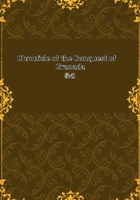
第19章
*Cronica de los Duques de Medina Sidonia, por Pedro de Medina, MS. Ferdinand and Isabella were at Medina del Campo when tidings came of the capture of Alhama. The king was at mass when he received the news, and ordered "Te Deum" to be chanted for this signal triumph of the holy faith. When the first flush of triumph had subsided, and the king learnt the imminent peril of the valorous Ponce de Leon and his companions, and the great danger that this stronghold might again be wrested from their grasp, he resolved to hurry in person to the scene of action. So pressing appeared to him the emergency that he barely gave himself time to take a hasty repast while horses were providing, and then departed at furious speed for Andalusia, leaving a request for the queen to follow him.* He was attended by Don Beltram de la Cueva, duke of Albuquerque, Don Inigo Lopez de Mendoza, count of Tendilla, and Don Pedro Mauriques, count of Trevino, with a few more cavaliers of prowess and distinction. He travelled by forced journeys, frequently changing his jaded horses, being eager to arrive in time to take command of the Andalusian chivalry. When he arrived within five leagues of Cordova the duke of Albuquerque remonstrated with him upon entering with such incautious haste into the enemies' country. He represented to him that there were troops enough assembled to succor Alhama, and that it was not for him to venture his royal person in doing what could be done by his subjects, especially as he had such valiant and experienced captains to act for him. "Besides, sire," added the duke, "Your Majesty should bethink you that the troops about to take the field are mere men of Andalusia, whereas your illustrious predecessors never made an inroad into the territory of the Moors without being accompanied by a powerful force of the stanch and iron warriors of Old Castile."
*Illescas, Hist. Pontifical.
"Duke," replied the king, "your counsel might have been good had I not departed from Medina with the avowed determination of succoring these cavaliers in person. I am now near the end of my journey, and it would be beneath my dignity to change my intention before even I had met with an impediment. I shall take the troops of this country who are assembled, without waiting for those of Castile, and with the aid of God shall prosecute my journey."*
*Pulgar, Cronica, p. 3, cap. 3.
As King Ferdinand approached Cordova the principal inhabitants came forth to receive him. Learning, however, that the duke of Medina Sidonia was already on the march and pressing forward into the territory of the Moors, the king was all on fire to overtake him and to lead in person the succor to Alhama. Without entering Cordova, therefore, he exchanged his weary horses for those of the inhabitants who had come forth to meet him, and pressed forward for the army.
He despatched fleet couriers in advance, requesting the duke of Medina Sidonia to await his coming, that he might take command of the forces.
Neither the duke nor his companions-in-arms, however, felt inclined to pause in their generous expedition and gratify the inclinations of the king. They sent back missives representing that they were far within the enemies' frontier, and it was dangerous either to pause or turn back. They had likewise received pressing entreaties from the besieged to hasten their speed, setting forth their great sufferings and their hourly peril of being overwhelmed by the enemy.
The king was at Ponton del Maestre when he received these missives.
So inflamed was he with zeal for the success of this enterprise that he would have penetrated into the kingdom of Granada with the handful of cavaliers who accompanied him, but they represented the rashness of such a journey through the mountainous defiles of a hostile country thickly beset with towns and castles. With some difficulty, therefore, he was dissuaded from his inclination, and prevailed upon to await tidings from the army in the frontier city of Antiquera.